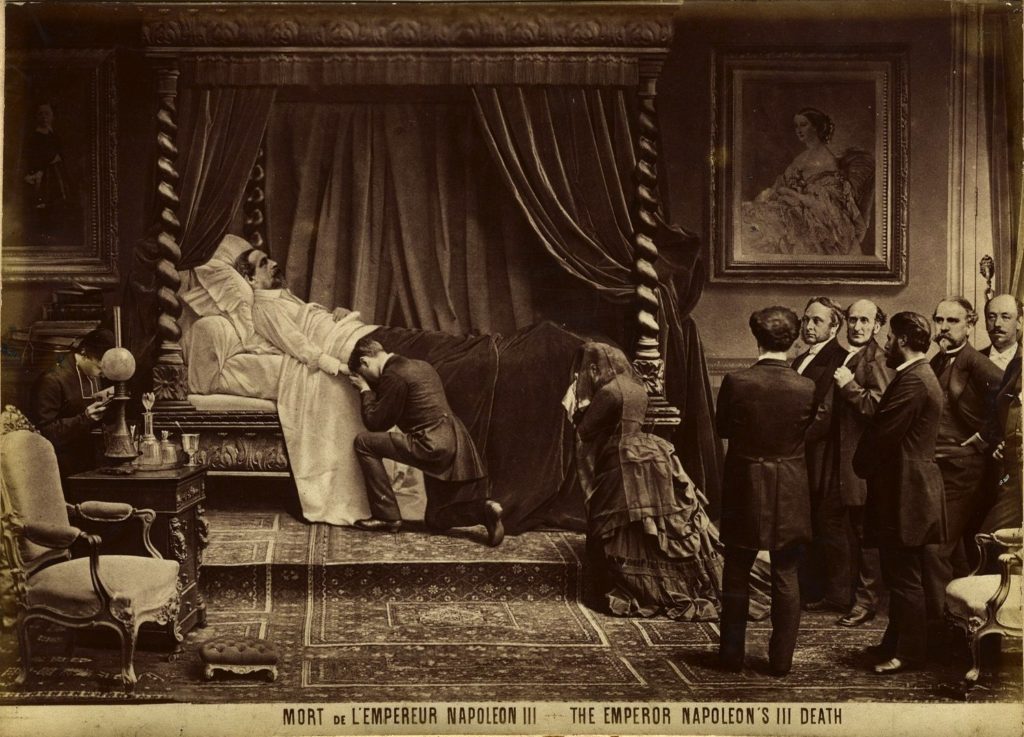On this day (9th January) 1873, Louis-Napoleon Bonaparte, former French Emperor Napoleon III, nephew of Emperor Napoleon I, died at Camden Place in Kent, now the site of Chislehurst Golf Club. It was a rather ignominious end to a very eventful and impactful life.

He is perhaps most famous today, in the English-speaking world at least, for being the object of Karl Marx’s famous claim that ‘all great world-historic facts and personages appear, so to speak, twice […] the first time as tragedy, the second time as farce.’
In comparing the rise of Napoleon I to power via the coup d’état of 9 November 1799 with Louis-Napoleon’s coup d’état of 2 December 1851, Marx painted an unflattering picture of the nephew and of the French more generally as a people haunted by ghosts from a heroic past, which prevented social and political progress in the mid-nineteenth century.
However, there is an argument that Louis-Napoleon’s time in power represented a significant historical step forward, just not in a wholly positive sense.
The 22-year period from his election as President of the French Republic in 1848, to his coup d’état against that same Republic in 1851, his adoption of the title Emperor Napoleon III upon declaring the Second French Empire in 1852, right on through to his surrender and abdication in 1870 during the Franco-Prussian War marked one of the most important periods in modern French history.
He oversaw and encouraged massive expansion in the transportation and finance sectors, paving the way for rapid growth in French industrial production and the consumer economy, transforming France into an economic, military and political powerhouse whilst presiding over a systematically corrupt imperial court whose decadence was legendary. Urban infrastructure was likewise overhauled during the Second Empire, with Paris given much of its modern façade of grand boulevards and iconic buildings largely at the expense of those who had the misfortune to live in the condemned medieval dwellings.
In terms of foreign policy, there were substantial French colonial expansions into North Africa, the Americas and South-East Asia with long-lasting consequences (not least in the victory of Benito Juárez over French-backed forces in Mexico). An alliance with the UK was forged in the Crimean War and Napoleon III played a central role in bringing about the formation of the Kingdom of Italy in 1861. It was finally due to his own and his regime’s blunders that German unification was made possible via the shocking defeat of the French in the Franco-Prussian War of 1870-71: King Wilhelm I was crowned Emperor in the Palace of Versailles whilst Paris was besieged!
Beyond this, and perhaps most important of all for 21st century readers, was Louis-Napoleon’s status as not only the first President to be elected by universal male suffrage in French history, but also as the orchestrator of a coup that demolished the Second French Republic and replaced it with an Empire that was authoritarian and yet retained the practice of universal male suffrage through nationwide elections and referendums and ultimately sought to ‘liberalise’ by introducing a parliamentary constitutional monarchy in 1870, just before the outbreak of the Franco-Prussian War.
I am writing this piece, just three days on from the anniversary of an attempted coup d’état in the United States, tacitly supported by a former President, and can see fresh images of Russian troops on the streets in Kazakhstan sent in by an elected Russian President to restore a dictatorship to power. These are far from isolated events. We live in a world in which authoritarian democracy is a living, breathing reality and far from fulfilling Marx’s picture of a backward-looking farce doomed to failure, it is a style of government that is very much on the march. This is, therefore, a good opportunity to reflect upon the life and times of Louis-Napoleon Bonaparte, one of the first democratic dictators and a deadly serious one to boot.
Recommendations for further reading:
- Theodore Zeldin, The political system of Napoleon III (1958)
- T. A. B. Corley, Democratic despot: a life of Napoleon III (1961)
- Sudhir Hazareesingh, From Subject to Citizen : the Second Empire and the Emergence of Modern French Democracy (1998)
Author:
Dr W. Jack Rhoden (Bishop Grosseteste University) is a specialist in nineteenth-century France in wrote his doctorate on ‘Caricatural representations of Louis-Napoleon Bonaparte, 1848-1871’ at the University of Sheffield. He has written several pieces around this topic, and contributed to edited volumes and journals including Midland History.


